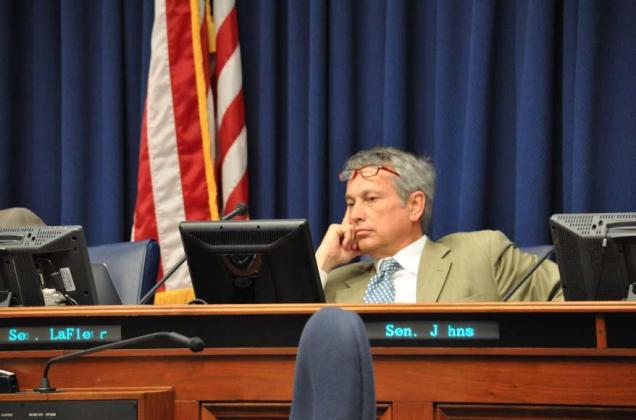
By Paul Braun and Tryfon Boukouvidis
LSU Manship School News Service
BATON ROUGE – With the Legislature’s approval this weekend of a compromise to fund the state’s budget, ending a conundrum that has tormented lawmakers and citizens alike for the last three years, two Senate leaders reflected on how the deal came together and what lies ahead for Louisiana.
Committees led by the senators, Democrats Eric LaFleur of Ville Platte and J.P. Morrell of New Orleans, approved the bills that included the breakthrough terms that Gov. John Bel Edwards and the House had agreed to, and the full Senate ratified the deal Sunday.
Under that deal, the state will renew 0.45 percent of an expiring penny of sales tax for seven years and use an additional $463 million in revenue from that tax to fully fund TOPS scholarships, higher education and other parts of the state budget that had been vulnerable to cuts.
“I think the seven years is more important than the number was,” Morrell said of the 0.45 rate, which will lower the state portion of the sales tax to 4.45 percent on July 1 from 5 percent.
“There are no triggers, there are no caveats,” he said. “It’s seven years of stable revenue while they try to figure out how they want to deal with tax reform.”
Morrell added that the stability would improve the state’s standing in the eyes of its creditors and lower its borrowing costs, a benefit that Edwards also highlighted.
That could save the state money on capital outlay projects, an area that could receive greater focus from the Legislature, Morrell said, with the fiscal cliff now behind it.
LaFleur said he does not see much appetite for broader tax reform but expects the state’s teachers to campaign for a pay raise, in step with a growing national trend.
The compromise came after intense sparring between House Republicans, who initially wanted to extend only one-quarter of a cent of the state sales tax and worked their way up to four-tenths of a cent, and Edwards, the Democrats and most Senate Republicans, who wanted to extend a half of a cent to fund more services.
By late last week, the gap between the two sides amounted to only 10 cents on a $100 purchase. LaFleur said they agreed to split the difference because it “just seemed foolish” to argue over “such a small amount of money that each person would have to pay on an annual basis.”
“We’ve been arguing about one-tenth of a penny,” he said. “There’s not an economist in America that would say that is enough to hurt the economy or grow government beyond its wildest dreams.”
Democrats viewed the negotiations as a chance to make up the annual revenue that was lost through income-tax cuts by the administrations of former governors Kathleen Blanco and Bobby Jindal. They said there was no way to keep from cutting TOPS and making further cuts in higher education without the additional revenue.
The House Republicans had maintained that Edwards was asking for more money than was needed. They said they wanted to hold down taxes to shrink the size of state government and free up more money for growth in the private sector.
The final deal included $42 million in budget cuts, and a companion budget bill approved by both houses Sunday divided those among the Corrections Department, the juvenile justice system and other agencies.
House Speaker Taylor Barras, R-New Iberia, said in an interview that he saw gains for both sides.
“It was important to the Republicans that we not overtax anyone if we could help it,” he said, and “for the Democrats, I think, it was to maintain the services that they think were important to the people in their districts.”
LaFleur said the governor should be more empowered by the results, as he was able to fully fund health care services for poorer state residents, which the most conservative Republicans wanted to gut.
Edwards, who is up for re-election next year, also saved the food stamps program from elimination and won full funding for higher education, which some Republicans also were willing to cut.
But LaFleur added that contingents in each party both won and lost in the deal.
Republicans got funding for TOPS, which is mostly a benefit for middle- and upper-middle-class residents, but did so while also funding hospitals for the poor, he said.
The Louisiana Legislative Black Caucus secured funding for programs valued by its constituents, like hospitals and food stamps, but had to retain a financing vehicle -- the sales tax -- that is generally seen as placing a disproportionate burden on low-income families.
But perhaps the biggest loser, LeFleur said, was the Legislature itself and its reputation among voters.
“Taxpayers have lost a lot in the last six months as we have talked about, at the end of the day, one-tenth of a penny,” he said. “To me, the Legislature lost more than anybody as a legitimate policymaker.”
“Because I think people look at what we did and recognize that it was purely political gamesmanship and had nothing to do with public policy,” he added. “So while the members of both sides sought to declare a victory or a loss, the taxpayers were caught just sitting out there watching us play this stupid game at their expense.”
